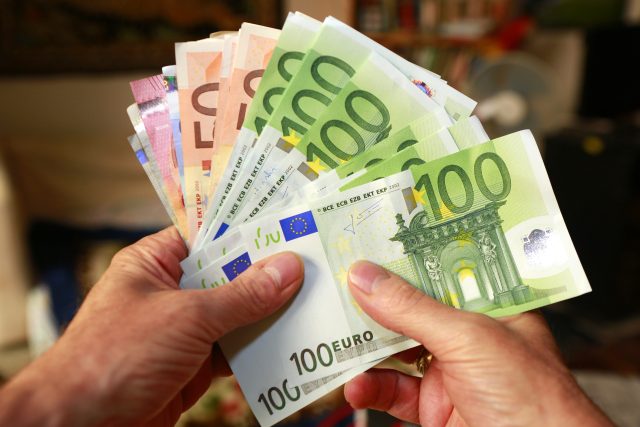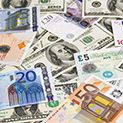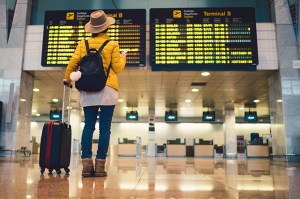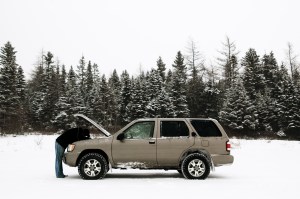Are you headed abroad sometime soon? If you’re traveling to another country, you’ll need to decide how to exchange your money into foreign currency. What’s the best way to exchange your money, and how much should you bring with you? Here are some dos and don’ts for foreign currency exchange, and how you can do a foreign currency exchange at AAA Northeast.
Don’t
Exchange Currency at the Airport
When you need to exchange currency, it can be tempting to use a kiosk or booth at the airport. At first glance, it seems like the most convenient option. However, airport currency exchanges often come with extra fees and steep exchange rates. Airport kiosks or booths know that at that point in your trip, you don’t have a lot of other options. That means they can take advantage of you, and you probably won’t get a fair exchange for your money. Plus, airports can be hectic, crowded places. You don’t want to get stuck in a long line when you have a plane to catch or an adventure to begin. That just takes precious time out of your trip and adds extra hassle to your travel days.
Do
Use a Bank or a Credit Union
It’s smart to have some foreign cash on hand when you’re traveling to another country, so you should get your foreign currency exchange done before you even get to the airport. Banks and credit unions usually have more reasonable fees and exchange rates than companies that are solely dedicated to foreign currency exchange.
If you’re a AAA Northeast member, you can exchange your currency for no added fee at your local AAA Northeast branch location. AAA Northeast members who are in good standing for one or more years can use a personal check to purchase foreign currency up to $3,000 at a time. When using cash or a debit card, you can purchase even more. There are dozens of foreign currency types available for exchange. Amounts greater than $200 will be shipped free to the branch location of your choosing — just remember that shipping can take up to three business days, so plan accordingly. During peak travel seasons, like holidays or summer vacation, shipping can take from five to seven days. Exchanges for less than $200 have a $10 shipping fee. Doing your foreign currency exchange at AAA Northeast is a great way to avoid extra fees and the last-minute hassle of airport exchanges. Other regional AAA clubs may have different policies, so make sure to check beforehand if you’re not in the AAA Northeast area.
Don’t
Rely Solely on Your Credit Card
When you’re traveling, credit cards are great for big purchases. But you shouldn’t use it for everything. Some credit cards have foreign transaction fees, which are applied when you purchase something outside of the country. These fees can range up to 3%, so make sure to check what your credit card’s foreign transaction fees are before you travel.
Do
Keep Cash on You
Depending on where you’re traveling, credit and debit cards might not be accepted everywhere you go. It’s not unheard of for a small cafe or a local shop to be cash-only, and you don’t want to miss out. When you’re out and about, you should have a small amount of the local currency with you. You never know when you might need it!
Don’t
Get More Money Than You Need
When you’re doing a foreign currency exchange at AAA, it might be tempting to just hit the limit and get $3,000 worth of your desired currency. But more foreign currency isn’t always better. Depending on the exchange rate you get, you’ll likely lose some value. If you do have currency left over, you can also exchange it at a AAA branch location. Just remember that AAA Northeast can only process buybacks for currency originally purchased at AAA Northeast up to but not exceeding the original sale amount.
Do
Spend Your Foreign Currency Before Returning Home
Before you do your foreign currency exchange, you need to figure out how much cash you’ll need to carry. Roughly, each person in your group will probably need $50 to $100 per day. If you’re going to an area where ATMs will be safe and easy to access, around $50 per person per day could be just right. By the end of your trip, figure out how much of the local currency you have left and try to spend it while you’re in the country. You could treat yourself to a special souvenir or even pay for restaurant or hotel bills partially in your leftover cash. If you explain that you’re leaving the country soon and want to spend your local currency, most businesses won’t mind splitting a bill between cash and credit.
Don’t
Use American Money
Some businesses in tourist-heavy foreign countries will accept US dollars. But you should pay in the local currency anyway. Whether you’re using cash or card, the exchange rate at these businesses could be predatory and unreasonable.
Do
Familiarize Yourself with Local Currency
If you’re using the local currency, try to keep the exchange rate in mind. When you’re paying with a currency that’s unfamiliar to you, it can be easy to overpay for things and waste your money unknowingly. Get familiar with the local currency before your trip so that you really know how much it’s worth.
AAA Northeast members can exchange currency at your local AAA branch location.
How much cash do you bring with you when you travel abroad? Share your tips in the comments below.
This article has been updated and republished from a previous version.
42 Thoughts on “Foreign Currency Exchange Do’s and Don’ts”
Leave A Comment
Comments are subject to moderation and may or may not be published at the editor’s discretion. Only comments that are relevant to the article and add value to the Your AAA community will be considered. Comments may be edited for clarity and length.














As noted, bank ATMs in country where you want currency usually offer the best rates — and are more convenient than going into a bank in that area. However, do check your debit card policy before travel to see if you’re charged foreign conversion fees. Most do, but some don’t. Also worth underlining that having a Visa or Mastercard that DOES NOT charge foreign conversion fees can save you lots of money on big ticket items (hotel bills, nicer restaurants, more expensive transportation that you buy while abroad or from a foreign organization) — and it’s generally easier to get a new card than a new bank checking account. Also note that some of the currency conversion kiosks in larger tourist areas can offer reasonable rates, but compare and make sure to take into account any extra fees. Good travels!
Is it possible to exchange my foreign currency to dollars at AAA after my trip, even if I did not use AAA to obtain the foreign currency before the trip?
Hi, Joan! AAA Northeast does not exchange foreign currency to American dollars.
– Sarah
Hi:
Thanks for a great and timely article. I leave for Italy on Friday. Now that I know that my club can get me Euros with no fees, I’ll certainly do t his next time I travel abroad.
Thank you again for all the good things you do for us members!
Jon
When obtaining foreign currency in the country of use, first, use a Bank ATM, not a generic one. Second, it is preferable to do transactions during business hours in case something goes wrong. Third, do have your U.S. bank make the conversion; it will result in the best rate. Note for Japan: the Post Office gives a secure and excellent rate and should be used instead of a bank if a convenient location is found. At ATMs in Portugal the choice was “do you want to accept this bank’s rate”. Initially I read this as accept or cancel the request. It did mean, accept our rate or risk your bank’s rate.
Why is there no mention of Traveler’s Checks? Has AAA stopped selling them?
Hello Ronald, we no longer offer Travelers Cheques in our AAA Northeast branches. However, we do offer foreign currency exchange available in over 70 countries. I have attached the link where you can learn more. https://northeast.aaa.com/travel/plan-your-trip/travel-money.html Thank you!
My daughter was in Italy this past summer and said that she could not use her Discover Card at most places. Had a mastercard as a backup. I saw Bank of America Travel card recommended to avoid exchange fees; any other recommendations? Thanks.
If you make hotel reservations be aware of whether you can pay in cash and which credit cards they accept. I just returned from Sweden and they are moving to a “cashless society” in many ways. In the airport shops were not accepting cash so if you are planning on using coins you will be bringing them home unless there is a donation box in which to drop them.
I don’t understand how people are getting foreign currency from their AAA offices, ours told me in person and it also says on the national website that this service is not available right now.
Hi Michelle! This article only pertains to AAA Northeast. Other regional clubs, like AAA Northern New England, might have different policies.
-Sarah
This article was a deceiving piece of information and advertisement for AAA. There was no mention of currency exchange services not being available to certain areas in the article. This makes me very disappointed with AAA and dealing with the office I called. There was no service beyond “we don’t offer this service”; at least give your customers more information to help out with an area that they don’t know much about yet AAA markets itself as a travel agency. https://www.ace.aaa.com/financial/vacation-money.html
I am very disappointed that I didn’t receive any service in the travel topic that I called about.
Hi Kathryn! I’m sorry you were not able to exchange currency through your regional club, but we do mention in the opening of this article that this is in regards to currency exchanges at AAA Northeast. I hope the rest of your travel plans go smoothly!
-Sarah
When I went to my local branch in Bangor, Maine they said that AAA has not been during currency exchanges since the pandemic — so I think the article is a little deceiving even for the AAA Northeast region
Hi Kevin! It sounds like your club is actually AAA Northern New England.
-Sarah
My AAA is now saying 2 weeks to get foreign currency. This seems a bit long when my friend’s bank said 2 days.
Thanks for reading, Jean Marie! This article pertains to foreign currency exchange at AAA Northeast. It might be different in other regional AAA clubs.
-Sarah
Taking the advice in this article, I tried to use AAA to exchange money for an upcoming trip. It seems it is NOT three business days now, it is five, so I arrived too late and now I am unable to exchange money prior to leaving.
This is your own company – need to have your facts straight so other people don’t get screwed like me…
Hi Amy, I’m sorry you had difficulty exchanging your money! I note in the article that it can take from five to seven days during peak seasons, and summer is a busy time for travel.
-Sarah
And I called my local office and their response was “We don’t do that any more since COVID”….
Thanks for reading, Elly! I’m not sure where you’re located, but AAA Northeast still offers this service. It might be different in other regional AAA clubs.
-Sarah
I have accumulated currency in coins from several countries. Are coins exchangeable anywhere in the New York area? It seems as though the article dealt with only “foldable” currency.
I generally use a no FT fee credit card for foreign travel. I will use my debit card at a reputable bank ATM for small amounts of cash (no fees.) When headed home I use whatever is left of my foreign money to pay the hotel bill (and credit card for the rest.)
exactly!!!! I have traveled up to 5 weeks in foreign countries, various trips, and yet to have an issue with using this method. Never have I brought foreign money with me! Besides, who would ever want to travel with as much money as offered in the guide? $50-$100 per day! Yikes that’s a lot of cash to carry and maybe needlessly spend on your exit. Also, since we have become a ‘cashless’ society as of late, I think CC purchases are not only welcomed but the standard in most places.
Good point. In most countries, reputable institutions’ ATMs equal the best exchange rate. Just make sure that your ATM card, probably also a debit card, doesn’t carry foreign transaction fees. Didn’t seem to be an issue years ago, but it is today.
How much US dollars allow to carry with you when going on vacation to a foreign country?
I always use AAA for foreign currency exchange because it is quick and easy. Also, I always remember to ask for SMALL bills because it is easier to spend them and not end up with a ton of foreign coins. In addition, if I do get coins at restaurants, I just leave that along with the bill-I was advised that the tipping in foreign countries is not necessary. Also when we travel out of the country on a tour, we plan the foreign currency for the tour guide tips and bus driver tips. We carry USD in small amounts to tip baggage handlers, etc. in USA. I like the idea of figuring $50-100 per day. Also, can you suggest what credit cards do NOT charge an exchange fee. I’d like one just in case. Also, thank you for suggesting bringing along a passport photo-I always brought a copy of my passport, but never thought of bringing an actual photo.
I use Bank of America’s Travel card, both while I’m overseas and pre-paying online for foreign tours/tickets prior to leaving the US. No transaction or exchange fees!
I have several credit cards that don’t have a foreign transaction fee, two of which are Discover and the Amazon Prime Card.
If I have foreign cash, can I exchange it at AAA if I didn’t get it there originally?
Thanks for reading, Deb! Unfortunately, AAA Northeast can only exchange foreign currency if you got it through AAA Northeast originally.
-Sarah
We recently traveled to Italy and wanted to buy Euros before we left at our local AAA as we have done in the past. I was told by a AAA NW Ohio Representative that they no long provided that service for members since the pandemic. So what is correct? Ralph Matzinger a AAA member since 1972
Thanks for reading, Ralph! AAA Northeast still offers this service. It might be different in other regional AAA clubs.
-Sarah
One thing you forgot to recommend. Around the world Euro’s and Dollars are recognized by the people almost universally. While they should never be used as a first or second option when, in the event of an emergency, having a little “universal” currency on you can be lifesaving. I am talking about bringing with you 100-200 dollars/euros bills. It is like having a picture of your passport and with some extra passport photos in case your passport gets lost. Allows you to navigate the unexpected.
This is great advice. Thanks for reading, William!
-Sarah
One thing that always confuses me: when you buy something with a credit card in a foreign country, should it be with local currency or US dollars? I never know which button to click. How do you minimize extra fees from your bank? Many thanks.
Thanks for reading, Eleanor! It’s a good rule of thumb to pay in the local currency.
-Sarah
Always choose the local currency option. The fewest re-conversions of money the less chance an extra fee will be tacked on by any of the processing entities that are involved in the transaction. And please. Get a credit card that does not charge foreign transaction fees. Esp, in Europe, those handheld transactions card machines are ubiquitous and cash is less and less being used. Know before you go that while exchange rates will fluctuate, know what the exchange rate was just before you leave to know if the rate you are getting is in the ball park or are you being ripped off. Enjoy parity of Euro and dollar, it usually only happens once every 10 years or so.
Not only should you get a credit card that doesn’t charge overseas transaction fees, you should ensure it has a chip and also allows for “tap and go” contactless” paying. Most cards now seem to have them, but there are still some out there without chips, which can be a problem, especially in Europe. In 2007, in Denmark, we could not use our no-chip credit card some places and relied on Danish cash. Europe was way ahead of the U.S. with chip technology at the time. Since then, we have credit cards that have the tap and go contactless chips and don’t charge overseas transaction fees.
Another thing we have done is to have an ATM card that has access to only one account – it is our travel-specific ATM card. We ensure this account has only money for the trip + a little extra so that if we get hacked from withdrawing cash at an ATM machine, the perps can’t drain all our accounts. It has worked out well. We try to go to ATMs that are inside banks or other businesses if possible rather than use an outdoor ATM.
I am a frequent visitor to Israel.( here now) At least for Israel the tips are 100% incorrect.
A. The bank owned ATM machines at the airport give exactly the same rate as the ones in the city.
B.I do not know the rate offered by the AAA, but every bank I ever checked in the US gives a significantly worse rate than that obtained in Israel
C. I agree not to rely solely on your credit card because some small places don’t accept. However it is not hard to find a card with no foreign currency charge.
Thanks for reading, Ellen! These tips are definitely pretty general, and there are always going to be exceptions to the rule. I hope you have a good time in Israel!
-Sarah